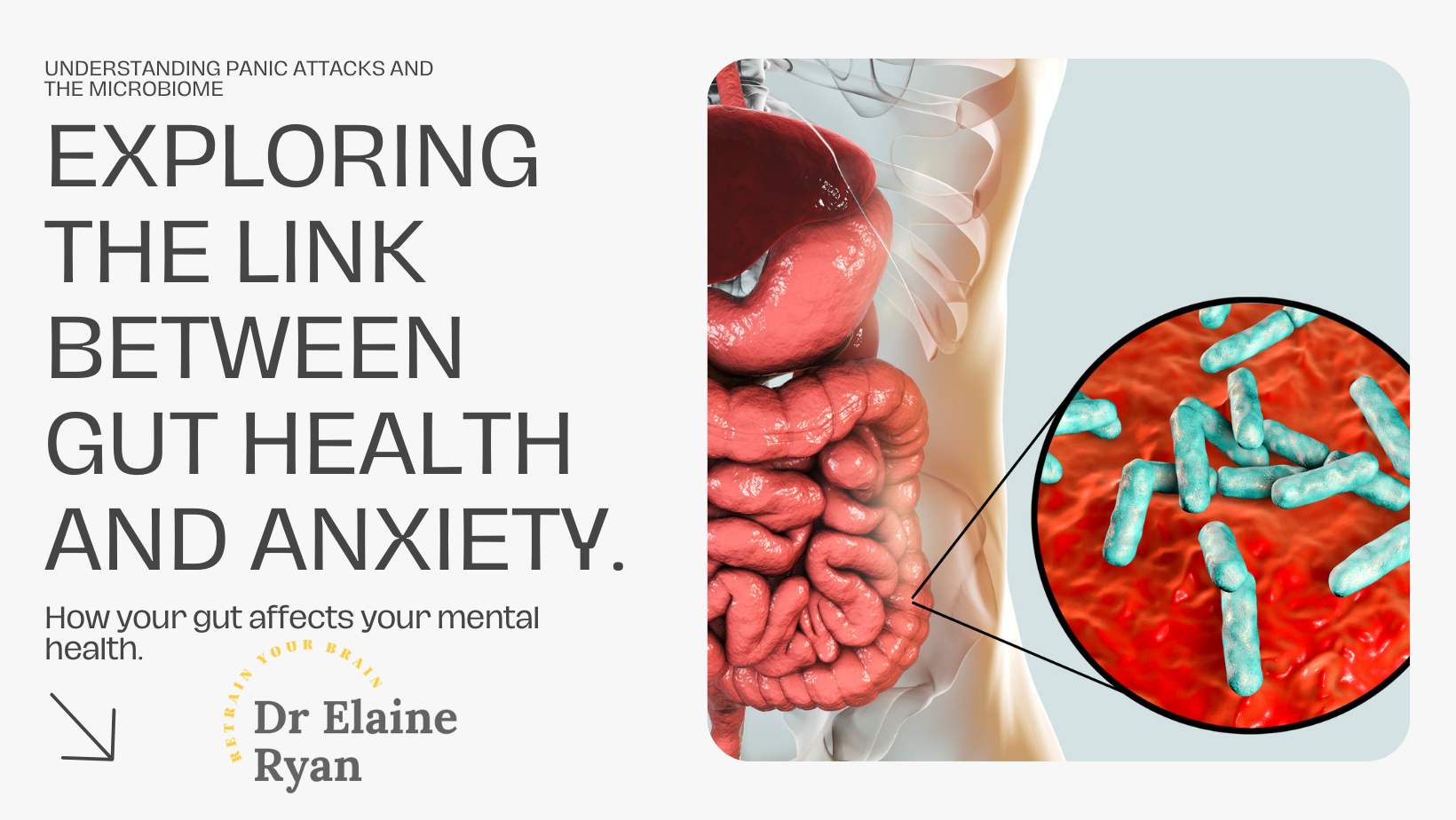News about gut health is everywhere at the moment. It is an emerging and exciting field of study, particularly for psychologists like me, as we begin to understand the impact our gut has on our mental health. I want to talk about panic disorder and gut health today. I am personally acquainted with both, as I had panic disorder and have recently spent time (and money) trying to improve the health of my gut.
Panic disorder, that debilitating mental health condition, may not be solely to do with your brain. Emerging evidence suggests that our gut microbiota could play a significant role.
In this article, I hope to show the interplay between panic disorder and the microbiome, looking at the latest research findings and their implications for how panic disorder might best be managed.
Panic Attacks Self-help

Dr Ryan’s online self-help course for Panic Attacks
Understanding Panic Disorder: Symptoms and Prevalence
Panic disorder is a type of anxiety disorder characterized by recurrent panic attacks.
These attacks are sudden bouts of intense fear that trigger severe physical reactions. I won’t go into detail talking about panic attacks, but you can read and learn about panic attacks here.
Symptoms can include rapid heart rate, sweating, trembling, shortness of breath, and a feeling of impending doom.
According to the National Institute of Mental Health, panic disorder affects about 2.7% of the U.S. population and 1.7% of the UK population, and although Ireland does not have figures at present, Mental Health Ireland states that 18.5% of the population has a mental health condition. That’s a staggering high percentage and all the more reason to look at different treatment options.
Understanding the symptoms and prevalence of panic disorder is the first step in exploring its potential link with the microbiome.
The Human Microbiome: A Brief Overview
The human microbiome refers to the trillions of microorganisms living in and on our bodies, iincluding bacteria, viruses, fungi, and other microscopic life forms.
Most of these microorganisms reside in our gut, particularly in the large intestine and they play crucial roles in digestion, immunity, and even the production of certain vitamins. That was a another plus I noticed in my change in diet was less tummy problems with the addition of foods like kimchi and kefir.
Recent research suggests that the microbiome may also have significant implications for mental health. I know since working on the health on my own gut, and in particular increasing fibre that not only do I sleep better, although that may be due to treating sleep apnea, but my mood feels lighter.
The Gut-Brain Axis: Linking Mental Health and Gut Health
The gut-brain axis is a bidirectional communication system between the gut and the brain.
It involves direct and indirect pathways, including the nervous system, immune system, and hormonal routes.
Emerging evidence suggests that the gut microbiota can influence this axis, affecting both gut health and mental health. This first came to my attention several years ago by the work being undertaken by the team at University College Cork.
For instance, certain gut bacteria can produce neurotransmitters, chemicals that transmit signals in the brain.
This discovery has led to a new field of research exploring the potential role of the microbiome in mental health disorders, including panic disorder.
Panic Disorder and the Microbiome: What Research Tells Us
Panic disorder is a debilitating mental health condition characterized by recurrent panic attacks.
These attacks are often accompanied by physical symptoms such as heart palpitations, shortness of breath, and dizziness.
Recent research has begun to explore the potential link between panic disorder and the microbiome.
Several studies have found differences in the gut microbiota of individuals with panic disorder compared to healthy controls.
For instance, certain bacterial species that are known to produce neurotransmitters may be less abundant in those with panic disorder.
This suggests that the microbiome could play a role in the development or exacerbation of panic symptoms.
However, it’s important to note that this is a relatively new field of research, and more studies are needed to fully understand this complex relationship, so we don’t need to get rid of CBT just yet!
Despite the challenges, these findings open up exciting new possibilities for the treatment of panic disorder.

Dysbiosis and Panic: How Imbalance in Gut Bacteria Can Affect Anxiety
Dysbiosis refers to an imbalance in the gut microbiota.
This imbalance can occur due to various factors such as diet, stress, and medication use. Most of us are familiar with the effect of antibiotics on our gut, we might not fully understand the workings, but reach for probiotics when prescribed antibiotics.
Research suggests that dysbiosis may contribute to the development of anxiety and panic attacks.
For instance, certain harmful bacteria can trigger inflammation and stress responses, potentially leading to anxiety symptoms.
Moreover, dysbiosis can disrupt the production of neurotransmitters by gut bacteria, which may affect mood and anxiety levels.
Probiotics and Psychobiotics: Potential Allies in Managing Panic Disorder
Probiotics are live bacteria and yeasts that are beneficial for our health, especially the gut; hence why I am not eating kimchi kefir and other fermented foods every day.
They can help restore a healthy balance of gut bacteria, potentially alleviating anxiety symptoms.
Psychobiotics, a subset of probiotics, are specifically intended to improve mental health.
They can influence the gut-brain axis, potentially offering a novel approach to treating panic disorder.
However, more research is needed to fully understand their effectiveness and safety.
Diet and Lifestyle: Modulating the Microbiome for Better Mental Health
Diet plays a crucial role in shaping our gut microbiome.
A diverse diet rich in fibre, fruits, vegetables, and fermented foods can promote a healthy microbiome.
On the other hand, a diet high in processed foods and sugars can lead to dysbiosis, which is why I had to ditch my Ben & Jerry’s.
Lifestyle factors such as exercise and sleep also influence our gut health.
Therefore, a balanced diet and healthy lifestyle could potentially help manage panic disorder symptoms.
The Future of Treatment: Personalized Medicine and the Microbiome
The future of panic disorder treatment may lie in personalized medicine. I particularly like the idea of this, and in my own case I know understand that gut imbalances and sleep apnea played a part in panic disorders
This approach considers individual differences in the microbiome.
By tailoring treatments to a person’s unique gut bacteria, we could potentially improve outcomes.
This could involve the use of specific probiotics, dietary changes, or other microbiome-targeted interventions.
However, more research is needed to fully realize the potential of this approach.
Challenges and Ethical Considerations in Microbiome Research
Microbiome research is not without its challenges.
One major hurdle is the complexity of the gut microbiota.
With trillions of bacteria and hundreds of different species, it’s a daunting task to decipher their individual and collective roles.
There are also ethical considerations to take into account.
Manipulating the microbiome for mental health purposes raises questions about long-term effects and potential risks.
Conclusion: Integrating Gut Health into Mental Health Strategies
The link between panic disorder and the microbiome is a promising area of research.
It offers a new perspective on mental health, highlighting the importance of gut health.
Integrating gut health into mental health strategies could revolutionize treatment approaches.
However, more comprehensive studies are needed to fully understand this complex relationship.
With continued research, we may soon see a paradigm shift in how we approach mental health care.
